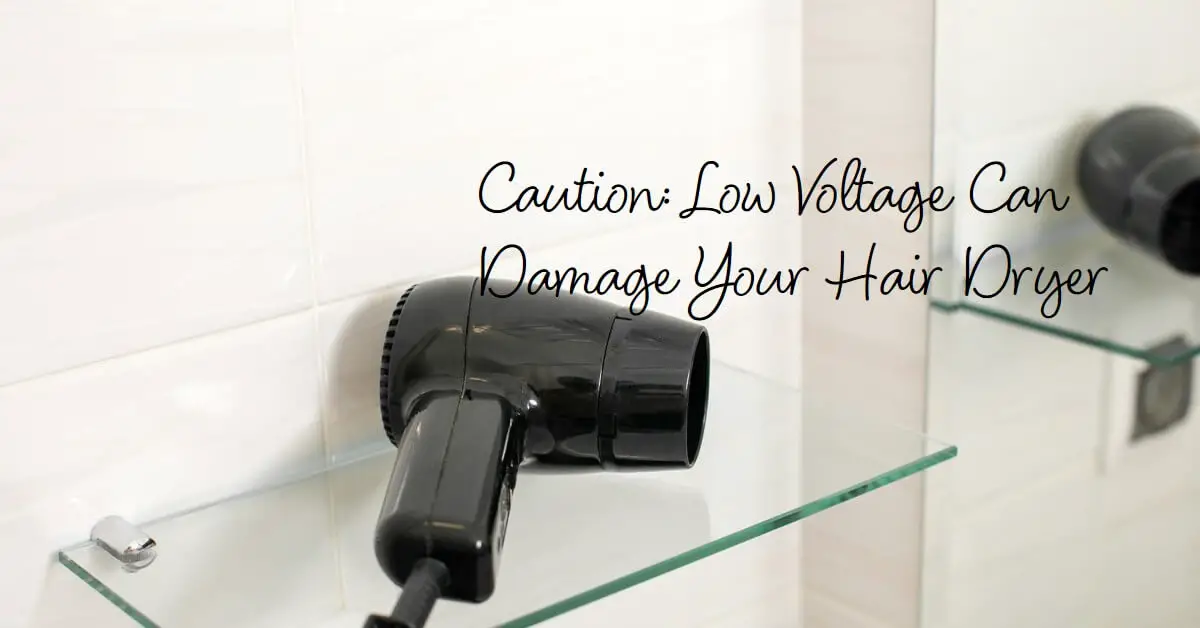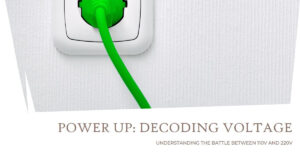Image: “Article Feature Image” by Bing, Source: [Bing Graphic Art].
Hair dryers are essential tools in our daily grooming routines, providing quick and efficient hair-drying solutions.
However, many people overlook a critical aspect when using hair dryers: understanding voltage requirements. Can low voltage damage your hair dryer? Yes, using a hair dryer in a low-voltage setting can potentially damage it.
In this article, we will explore the potential dangers of using hair dryers in low-voltage settings and offer practical tips to protect your beloved hair-styling companion.
Understanding Voltage and Hair Dryers
Before delving into the impact of low voltage on hair dryers, let’s grasp the concept of voltage. Voltage refers to the electrical force or pressure that pushes the flow of electricity through a device. Hair dryers, like most electrical appliances, have specific voltage ratings that determine their safe and optimal operation.
Most hair dryers in the USA operate at a standard voltage of 120 volts. However, it’s crucial to check your hair dryer’s label or user manual to confirm its voltage requirements.
Some hair dryers are designed as dual voltage, meaning they can handle both 110-120V and 220-240V. These dual voltage models are handy for travelers, as they can be used worldwide with the appropriate adapters.
Can Low Voltage Damage My Hair Dryer?
Using a hair dryer in a low voltage setting can indeed lead to potential damage. When a hair dryer operates at a voltage lower than its specified requirement, it struggles to draw sufficient power to function correctly. As a result, the hair dryer may experience several issues that can negatively impact its performance and longevity.
Signs of Damage Caused by Low Voltage
- Reduced Heat and Airflow: A hair dryer operating at low voltage may produce weaker airflow and inadequate heat, resulting in longer drying times and unsatisfactory results.
- Overheating and Burnout: In an attempt to compensate for the lack of power, the hair dryer’s motor may work harder, leading to overheating. This can cause internal components to burn out, rendering the hair dryer useless.
- Weakened Motor Performance: The motor is the heart of a hair dryer, and low voltage can strain it, leading to a decline in motor performance over time.
Common Mistakes and Risks
Many people unknowingly risk damaging their hair dryers by making common mistakes, such as:
- Using Adapters Instead of Converters: Plugging a hair dryer into a low-voltage outlet using a simple adapter does not change the voltage. It’s essential to use a voltage converter specifically designed for hair dryers.
- Ignoring Manufacturer Guidelines: Manufacturers provide specific voltage guidelines for their products. Ignoring these recommendations can lead to irreversible damage.
- Buying Incompatible Hair Dryers: Purchasing a hair dryer without considering its voltage requirements can be a costly mistake, especially when using it in regions with lower voltage.
The Dangers of Using Incompatible Hair Dryers
Apart from the potential damage to your hair dryer, using an incompatible device in a low-voltage setting poses safety hazards. It can increase the risk of electrical fires, electric shocks, and even damage to other electronic devices plugged into the same circuit.
Protecting Your Hair Dryer from Low Voltage Damage
Prevention is the key to safeguarding your hair dryer from low-voltage damage. Here are some practical tips:
- Using Voltage Converters/Transformers: Invest in a quality voltage converter or transformer specifically designed for hair dryers. These devices step up the voltage to match your hair dryer’s requirements, ensuring safe and efficient operation.
- Traveling with Hair Dryers – Precautions: If you’re taking your hair dryer abroad, ensure it is a dual voltage model. Additionally, pack the appropriate plug adapters to fit different outlet types.
- Proper Storage and Maintenance Tips: Store your hair dryer in a dry and dust-free environment. Regularly clean the air intake vents to prevent debris from clogging the motor and affecting performance.
Alternatives for Low Voltage Regions
In regions with consistently low voltage, consider alternative hair drying methods such as battery-operated hair dryers or manual techniques like towel drying and air drying.
Buying the Right Hair Dryer for Your Needs
When shopping for a hair dryer, always check its voltage requirements and opt for dual voltage models if you frequently travel.
Frequently Asked Questions (FAQs)
- Can I use a voltage converter with any hair dryer?
- Voltage converters are suitable for most hair dryers, but it’s crucial to check the converter’s wattage rating to ensure it can handle your hair dryer’s power consumption.
- Are there universal voltage hairdryers available?
- Yes, some manufacturers offer universal voltage hair dryers that automatically adjust to the voltage of the power source.
- What happens if I plug my hair dryer into a lower-voltage outlet?
- Plugging your hair dryer into a lower voltage outlet can cause damage to the motor and electrical components, leading to decreased performance or complete failure.
- Can low voltage damage other electrical appliances?
- Yes, using electrical appliances in low voltage settings can lead to damage and safety risks for various devices.
Conclusion
Taking care of your hair dryer’s voltage requirements is essential to ensure its efficient and safe operation.
By understanding the risks of using hair dryers in low voltage settings and following the recommended precautions, you can prolong the life of your hair dryer and avoid potential hazards.
Remember, prevention is always better than dealing with the consequences of damage caused by low voltage.
Want to learn more about electricity? Check my YouTube channel!
Are You An Electrical Engineer or Electrician?
Install my Free On Google Play Now! It’s 100% Free
The staff I recommend (Amazon Affiliate Links to products I believe are high quality):
- Economy 120 Volt/60Hz AC Power Source – Step-Down Voltage & Frequency Converters 1800W
- UNI-T Digital Multimeter Tester UT139C
- 50-Amp Extension Cord for RV “100ft”
- Voltage Stabilizer 110/220v
- Hair Dryer “best selling“
- TOSHIBA EM131A5C-BS Countertop Microwave Ovens
Disclaimer: This contains affiliate links to Amazon products. I may earn a commission for purchases made through these links.

